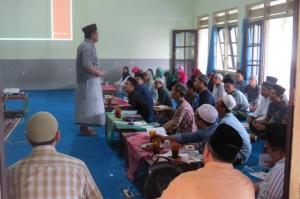Sukoharjo, NU Online
Some crucial problems recently faced by the people of Indonesia as discussed by the problems deliberation team at the Jombang's NU 33rd Congress were re-discussed at a meeting in Pesantren Al-Muayyad Windan Makamhaji Sukoharjo, Sunday to Monday (16-17/8).
<>
The leader of Pesantren Al-Muayyad Windan KH M Dian Nafi' called for the importance of Indonesian people to always keep up with the development of technology and human resourses in dealing with the issue of free market.
According to him, in the international market mechanism, Indonesia will compete closely with all countries around the world.
To that end, the quality of technology and human resources should to be prepared carefully. In the agricultural sector for example, farmers in Indonesia have still used the traditional ways, whereas in the Western countries, farmers have already used advanced technologies.
"As a result, in terms of both quality and quantity, Indonesian agricultural products are certainly far less than that in the United States and Europe. If this (fact) is put aside without a debriefing, people will become increasingly miserable," said the deputy general chairman of lawmaking body of the Central Java's Regional Board of Nahdlatul Ulama (PWNU).
BPJS problems were also taken up in the meeting. Different from the MUI considering the BPJS not in accordance with the Islamic law (syaria), Nahdlatul Ulama was of view that the government program was already in line with syaria for it is based on the so-called ta'awun (mutual help) contract. In addition, BPJS has a different orientation than the so-called ASKES.
As a speaker, Arif Budiman who is also a lecturer at the UIN Sunan Kalidjaga explained some logical reasons. "BPJS a new agency established by the government solely for the welfare of the people. Therefore, it is for the whole community. This differs from the ASKES which is only granted to government employees and had still a part of the State-Owned Enterprise (SOE)," he said.
In general, the Jombang's NU congress materials were discussed by four commissions, among others, the Commission of Bahtsul Masail Waqi'iyah (contemporary issues), Masail Maudlu'iyah (thematic issues), Masail Qanuniyah (regulation issues), and the program commission. (masdar)
Terpopuler
1
Gerhana Bulan Total Bakal Terlihat di Seluruh Indonesia pada Selasa 3 Maret 2026, Dianjurkan Shalat Khusuf
2
Gus Yahya Sebut Kepergian Ketum Fatayat Margaret adalah Kehilangan Besar bagi Keluarga NU
3
Ali Khamenei Wafat dalam Serangan Israel-Amerika
4
Innalillahi, Ketum Fatayat NU Margaret Aliyatul Maimunah Wafat
5
PBNU Instruksikan Qunut Nazilah Respons Agresi Israel-AS ke Iran
6
BMKG: Cuaca Ekstrem Masih Berpotensi Terjadi pada Awal Maret 2026
Terkini
Lihat Semua
















